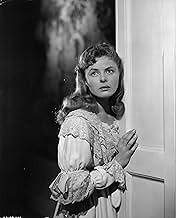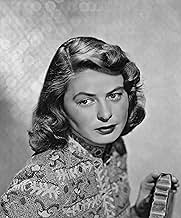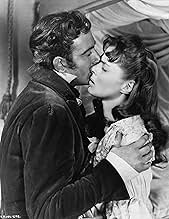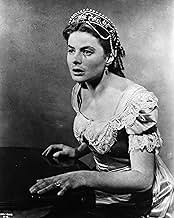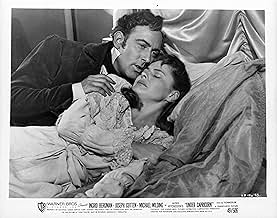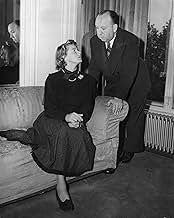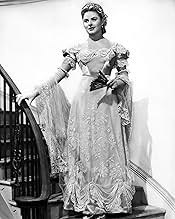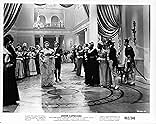Un joven viaja a Australia, donde se reencuentra con su novia de la infancia, ahora casada, sólo para descubrir que ella se ha vuelto alcohólica y alberga oscuros secretos.Un joven viaja a Australia, donde se reencuentra con su novia de la infancia, ahora casada, sólo para descubrir que ella se ha vuelto alcohólica y alberga oscuros secretos.Un joven viaja a Australia, donde se reencuentra con su novia de la infancia, ahora casada, sólo para descubrir que ella se ha vuelto alcohólica y alberga oscuros secretos.
- Dirección
- Guión
- Reparto principal
- Premios
- 3 premios en total
- Major Wilkins
- (as Francis de Wolff)
Reseñas destacadas
The problems start with the character of Charles Adare (Michael Wilding), a young man who comes to Australia to seek his fortune. He's the type of guy who'd make good comic relief but isn't suited to be the protagonist of a movie: a lazy, cheery, empty-headed aristocrat. Through Charles, we get introduced to some more interesting people: ex-convict Sam Flusky (Joseph Cotten) and his drunken, self-loathing wife Henrietta (Ingrid Bergman). Charles realizes that he knew Henrietta during childhood and tries to rehabilitate her, which causes long-repressed secrets and emotions to come to the surface. But since none of the characters initially engages our sympathySam is brusque, Charles is a lightweight, and Henrietta is a messit's difficult to care about any of this.
Hitchcock experimented with long takes in this movie, most notably an unbroken 8-minute- long monologue where Henrietta finally divulges her guilty secret. In one sense, this is the high point of the movie: a chance to marvel at Bergman's talent as she cycles through her emotional range without the camera ever cutting away. But in another sense, this scene displays everything that's wrong with "Under Capricorn." Henrietta's story is full of exciting passion and violence, but none of that emotion shows up during the rest of the movie. And the performers (including Bergman, Cotten, and Margaret Leighton, who plays a sinister maid) are at their best during their long monologues, not when they interact with one another.
"Under Capricorn" is not a horrible movie, just a dull one, so if you're curious about this anomaly in Hitchcock's catalog, there's no harm in spending two hours watching it. But, certainly, this movie would be forgotten today if anyone else had directed it.
The 1830s Australian setting proves very appropriate for the material, with the events unfolding in a newly-formed society with a primitive form of law enforcement, occupied by convicts and ex-convicts alike, where one's past is a dark secret of which nothing may be spoken. When an ambitious Irishman, Charles Adare (Michael Wilding), arrives in the Southern Land, the nephew of the new governor (Cecil Parker), he falls into an awkward friendship with the well-respected Sam Flusky (Joseph Cotton), an ex-convict who has made a name for himself on this new continent. Sam's wife, the beautiful Lady Henrietta Flusky (Ingrid Bergman), has suffered a mental breakdown, and, being an old childhood acquaintance, Charles considers it his duty to help this troubled woman to abandon her alcoholism and regain confidence in herself. Sprinkled about this stuffy Gothic melodrama are minor elements of suspense {most notable in the final scene featuring the scheming maid (Margaret Leighton)}, claustrophobia {as in Hitchcock's 'Rebecca (1940),' the old mansion is an character unto itself} and murder.
Though the story of 'Under Capricorn' isn't particularly interesting, and outstays its welcome by about one reel, the film is a fascinating feature from Alfred Hitchcock, and, if nothing else, exists as a testament to the director's technical ingenuity. The picture was Hitchcock's second in Technicolor, and its disastrous box-office performance led to the closure of the short-lived Transatlantic Pictures, which had been formed by himself and associate Sidney Bernstein after World War Two. The acting in the film is solid all around, without being particularly noteworthy, but the characters have enough twists to their personality to keep us watching. Long held as the forgotten black sheep of Hitchcock's output {except by the French, who apparently adored it}, 'Under Capricorn' is a worthy addition to the director's filmography, and stands as must-see viewing for all students of cinema.
I leave the debate over whether this is Hitchcock's worst film to those that debate such things and try to list everything comparing apples and potatoes seemingly for the sake of it. As surprising as it may be, I'm not one of those but I can understand why this film has been labelled such by others because it is surprisingly run-of-the-mill for that great director. The story is soapy etc on the surface but it had great dark potential with so many threads and emotions floating around. It is surprising then that none of them are made more of and the film just sticks with the genre by becoming nothing more than an acceptable period melodrama. There is still just about enough about it to make you remember that this was from Hitchcock but I was disappointed by how straight-down-the-line it actually was in the end. The direction is still good though, with nice camera movements and shots, and the sets are colourful enough to fit the genre (if not the spirit of birthing Australia).
The cast try hard but nobody can lift the material all by themselves. To his credit, Cotton tries hard with a brooding and dark performance but he can't do it alone. Bergman is good and could have done wonders with a much more complex character, in the end what she has to deliver is nothing special and just melodrama. I didn't care for Wilding; his performance wasn't up to much and I dn't think he eld his own that well alongside Cotton and Bergman. Support from Parker and Leighton is solid but they aren't given that much to do.
Overall then this is a serviceable enough melodrama but it is easy to see why fans of Hitchcock would be forgiven for expecting more to have been made of it. The cast is good and the potential is there in the story but, aside from a steady hand and a few interesting touches, this is really just a genre melodrama that could have been more than it was.
¿Sabías que...?
- CuriosidadesIn 1958, Cahiers du Cinema (French Film Magazine) voted this movie as one of the ten greatest movies of all time.
- PifiasAs the characters gather for the dinner party, fairly early on in the film, the camera tracks backwards across the dining room. The table has been pushed into the path of the camera by the time it comes into view, but the candlesticks are still shaking severely from the jerking appearance of the table (their shaking lessens as the take continues).
- Citas
[last lines]
Winter: We'll be sorry to lose you, sir.
Hon. Charles Adare: If I may say so, Winter, I'm sorry to go. Not a bad place. It is said that there is some future for it, there must be- it's a big country.
Winter: Then why are you leaving, sir?
Hon. Charles Adare: That's just it, Winter. It's not quite big enough. Bye, good luck.
- Créditos adicionalesOpening credits roll up over a map of Australia.
- Versiones alternativasThere is an Italian edition of this film on DVD, distributed by DNA Srl: "SOTTO IL CAPRICORNO (Il peccato di Lady Considine, 1949) New Widescreen Edition + FRAGILE VIRTÙ (1927)" (2 Films on a single DVD, with "Under Capricorn" in double version 1.33:1 and 1.78:1), re-edited with the contribution of film historian Riccardo Cusin. This version is also available for streaming on some platforms.
- ConexionesEdited into Histoire(s) du cinéma: Fatale beauté (1994)
Selecciones populares
Detalles
- Duración1 hora 57 minutos
- Color
- Relación de aspecto
- 1.37 : 1

